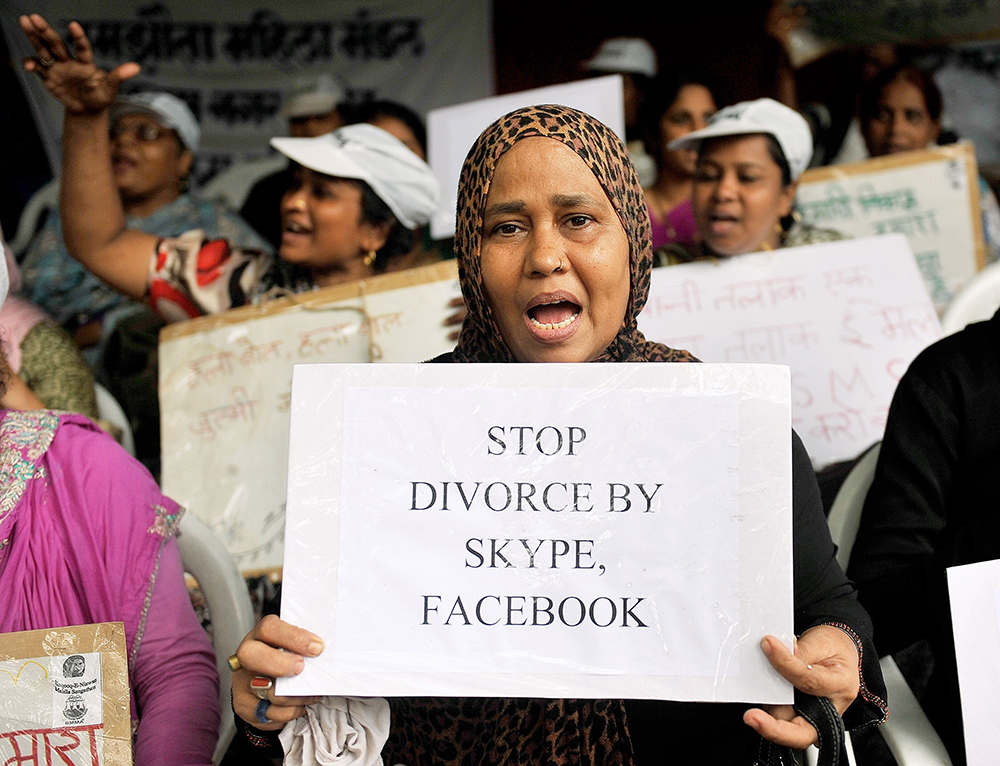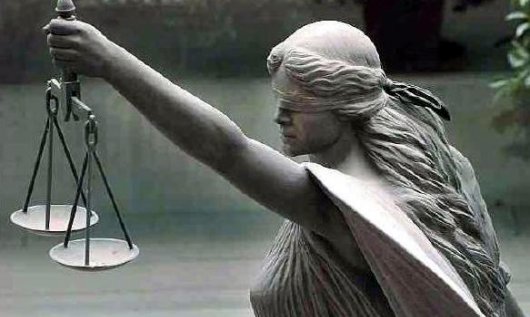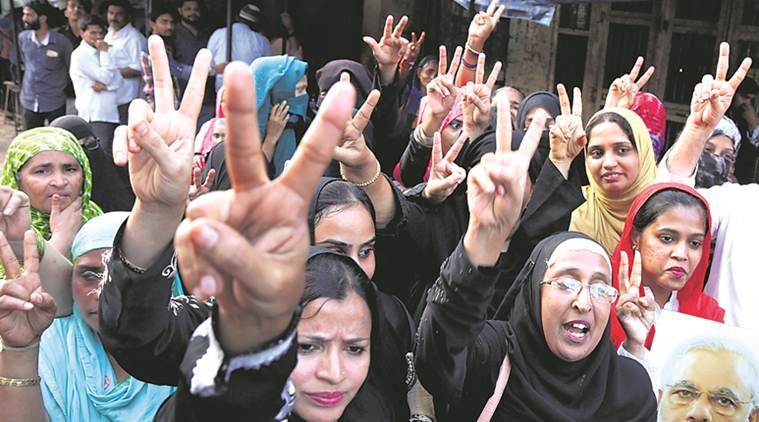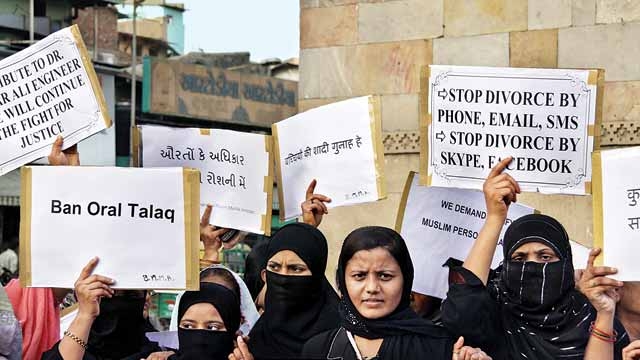
Of all the lawful acts the most detestable to God is divorce
–Prophet Muhammad
(This an authentic saying recorded by Abdullah ibn Umar, a highly respected companion of the prophet in an authoritative treatise “Divorce (Kitab Al-Talaq)” of Sunan Abu-Dawud (Ref. 63-2173)
The Supreme Court on Tuesday struck down the practice of instant triple talaq, calling it unconstitutional and in violation of Article 14 of the Indian Constitution, which provides for equality before the law. The five-member bench was divided 3-2 on the matter, with the majority verdict striking the practice down. However, the expectations that a Supreme Court verdict will clear the clouds surrounding the whole issue have largely been belied. Apart from a fractured verdict the judgment shows the conflict in the judicial mind. In fact in his dissenting judgment CJI Khehar said that talaq-e-biddat or instant divorce is an integral part of the Sunni community and has been practiced for a 1000 years
The SC said triple talaq violates the fundamental rights of Muslim women as it irrevocably ends marriage without any chance of reconciliation .instant triple talaq, or verbal divorce, is practiced by some in the Muslim community to instantly divorce their wives by saying talaq three times.
The reason religion is so central to a Muslim woman’s rights in India is that there is no universal code for Muslim personal law, that which relates to marriage, divorce, maintenance, inheritance, and custody India has separate sets of personal laws for each religion governing marriage, divorce, succession, adoption and maintenance. While much of the Hindu law overhaul began in the 1950s and continues, activists have long argued that Muslim personal law has remained mostly unchanged. Muslim personal law in India continues to remain in the domain of the religious clerks. Two laws, the Shariat Act of 1937 and the Muslim Women’s (Protection of Rights on Divorce) Bill (1986), ensure that Muslim women do not fall under civil law in matters related to marriage, but remain under Islamic law, as interpreted and administered by the Muslim clergy.
The history of codification in India has been a contentious one and has never been addressed formally by the citizen sector or government. A communally and politically sensitive issue, it is hard for any non-religious / secular group or the Government to take it up without being perceived as disrespectful of Muslims. As a result, India continues to remain one of only few countries yet to reform the Muslim Personal Law. By 1961, Pakistan reformed its Muslim Law, and one of the reforms introduced in Pakistan was on polygamy and divorce through arbitration. Similarly reforms in Tunisia and Turkey have led to the abolishment of polygamy in those countries. Iran, South Yemen and Singapore reformed their Muslim laws in the 1970s.
Triple Talaq is a contested Islamic way of getting a divorce where a husband can dissolve a marriage in the blink of an eye only by saying or writing the word Talaq – meaning divorce – three times in a row to his wife. Example, by saying “I reject you”, “I divorce thee”. A Talaq is unilateral divorce by a husband’s oral declaration as against Khula which is a divorce initiated on the application of the wife.
Quite apart from denying women’s rights, this custom has inherent absurdities. The moment a Muslim male utters “Talaq, Talaq, Talaq”, his wife becomes unlawful to him, even if he has uttered those words under coercion, in a fit of rage, in jest or drunken state and regrets his utterance the very next moment.
The only way out is for the woman to marry someone else, consummate the marriage, get the second husband to divorce her and then re-marry the first husband. This process is known as Nikah Halala and is actually a deterrent for men against this practice.
Several scholastic understandings of divorce within Islam do not support the notion of triple talaq in its current form and it is banned or not practised in many Muslim countries, including Algeria, Tunisia, Malaysia, Iran, Pakistan, Saudi Arabia, Turkey, Tunisia, Algeria, Iraq, Indonesia and Bangladesh.
The position of India’s Supreme Court on the issue has been quite categorical. In Shamim Ara vs State of UP, a judgment of 2002, the Supreme Court had invalidated arbitrary triple talaq and held that instantaneous triple talaq does not dissolve a marriage. This position has been time and again reiterated by Indian courts. The Supreme Court view is a reiteration of the judiciary’s earlier views.
The practice of Talaq was most certainly not introduced by Islam; it was rampant in the Arab society of the time and Islam tried to gradually reform in a very humane way. There is nothing in the law of Islam that suggests that the husband is free to pronounce Talaq in an irrational or unreasonable manner. It allows Talaq, subject to several conditions that are of a dissuasive nature, their purpose being to discourage the husband from exercising his right without careful consideration.
The truth is that the concept of instant triple Talaq is alien to Islam as it goes against the very spirit of the procedure of divorce laid down in the Quran. Even the Prophet, when he was informed about a man who gave three divorces at a time, was so enraged that he said: “Are you playing with the Book of Allah who is Great and Glorious while I am still among you?”
In 1929, Egypt was the first country to adopt a modern perspective held by scholar Ibn Taimmiyah (1268-1328) and theologian Ibn al Qiyam (1292-1350), with regard to the personal laws on marriage and family. Both Ibn Taimmiyah and Ibn al Qiyam declared that repeating “Talaq” three times would only be considered as the first step in the overall three-step process of divorce. “
Indian Muslims would do well to adopt the rules in Pakistan’s 1961 Muslim Family Laws Ordinance. It provides for an arbitration council to attempt reconciliation and a 90-day period for retraction. Talaq must be pronounced by a notice in writing and communicated to the council’s chairman. The wife can stipulate for the right to divorce in her Nikahnama or marriage contract (Talaq Tafuriz). Additionally, she has the right to dissolve the marriage (Khula).
This is where Morocco has provided an essential lead. Its new Islamic family law was produced with the full co-operation of religious scholars as well as the active participation of women. Every change in the law is justified – chapter and verse – from the Quran, and from the examples and traditions of the Prophet Muhammad.
In 1943, Maulana Abul Ala Maududi, the subcontinent’s leading ideologue, also opined against instantaneous Talaq – or Talaq-e-Bidʿah: “[Triple divorce] is an innovation and a sin leading to many legal complications. If people knew that triple divorce is superfluous and even a single Talaq would dissolve the marriage, of course, leaving room for revocation during the next three months and remarriage thereafter, innumerable families could have been saved from disruption.”
Muslims are now certainly responsive to change and are trying to develop a more contemporary and humane interpretation of Islam, and some countries are undergoing major transformations. More and more Muslims now perceive those erroneous interpretations of Islamic law that are glaringly unjust to women to be dangerously obsolete. And these include the Ulema as well as intellectuals and the common Muslims.
For Muslims it is a good time to pause, reflect, and attempt to re-locate the main features of, and re-discover, Islam. They need to take stock, not because they have arrived at any significant stage of the Islamic journey but because the sheer range of trajectories and approaches, and consequent confusion, obliges them to attempt clarification. The problem is not that there are too few answers but that there are too many. To put it in the words of the Quran:
“Those who listen to the Word and follow the best (meaning) in it: those are the ones whom Allah has guided and those are the ones endued with understanding.” (Q39:18)
Moin Qazi is the author of the bestselling book, Village Diary of a Heretic Banker .He has worked in the development finance sector for almost four decades .He can be reached at [email protected]














































